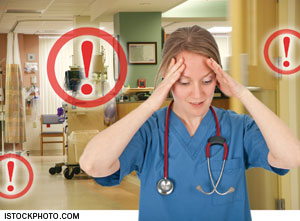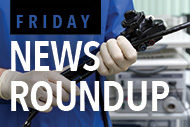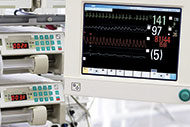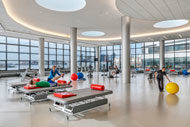 In response to growing concern over issues related to medical device alarm hazards and alarm fatigue among caregivers, several health care organizations have joined together to explore solutions to what they acknowledge is a complex problem impacting patients and caregivers.
In response to growing concern over issues related to medical device alarm hazards and alarm fatigue among caregivers, several health care organizations have joined together to explore solutions to what they acknowledge is a complex problem impacting patients and caregivers.
Leah Lough, executive vice president of the Association for the Advancement of Medical Instrumentation (AAMI) and executive director of the AAMI Foundation, Arlington, Va., says that her organization is working with experts across the health care community to establish a working committee to address the issue.
The alarm steering committee, expected to be a group of 14 comprising representatives from the Joint Commission, the Food and Drug Administration (FDA), physicians, nurses, device manufacturers and other experts, is tentatively scheduled to meet this summer to explore ways to improve medical device alarm management, says Lough.
The committee comes under the auspices of the Healthcare Technology Safety Institute, which is part of the AAMI Foundation.
The action is in response to a summit convened in October by AAMI, the Joint Commission, ECRI Institute, the FDA and the American College of Clinical Engineering to address the clinical alarm problem.
A report titled "A Siren Call to Action: Priority Issues From the Medical Device Alarms Summit" was issued after the meeting. It identifies seven so-called "clarion themes" from the summit, including:
- Deepen all stakeholders' understanding of use.
- Improve alarm system management.
- Improve alarm system integration.
- Reconcile challenges and differences in use in departments throughout the hospital.
- Strengthen medical electrical equipment standards to promote success.
- Clarify regulatory requirements.
- Share best practices and lessons learned.
ECRI Institute named alarm hazards No. 1 on its list of 2012 Top 10 Health Technology Hazards after being the No. 2 hazard in 2011 and 2010. Additionally, Lough says a survey of AAMI's members determined that dealing with medical device alarms is the industry's No. 1 challenge
this year.
The summit report says that medical device alarms can protect patients when they work as intended. The multitude of devices with alarms, unfortunately, has caused caregivers to experience sensory overload to the point of becoming overwhelmed, confused or misinformed.
"Clinical alarms are used in many different health care devices these days and it's created a lot of benefit, but also a lot of confusion for caregivers," says Jim Keller Jr., vice president, health technology evaluation and safety, ECRI Institute.
As a result, alarm systems can cause patient harm when they are disregarded, he says.
While the industry explores long-term solutions, more immediate improvement is possible, says Lough. "Some hospitals are trying to take steps to lessen the noise and try to figure this out in their own facilities," she says.
The summit report is available at www.aami.org/publications/AAMINews/Feb2012/reports.html. ECRI Institute also has an alarm safety resource site at www.ecri.org/Forms/Pages/Alarm_Safety_Resource.aspx.





